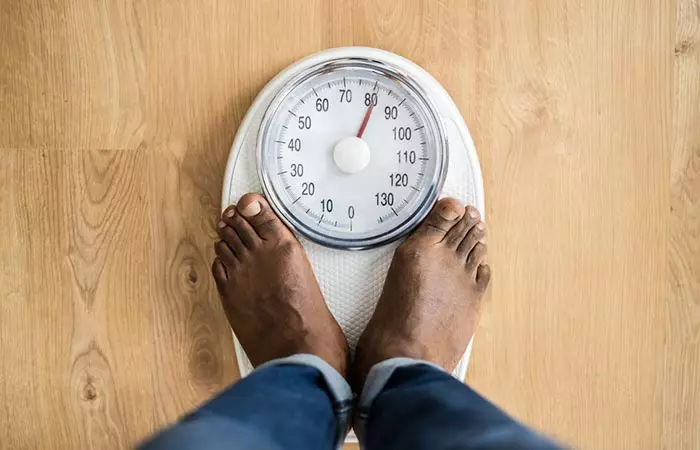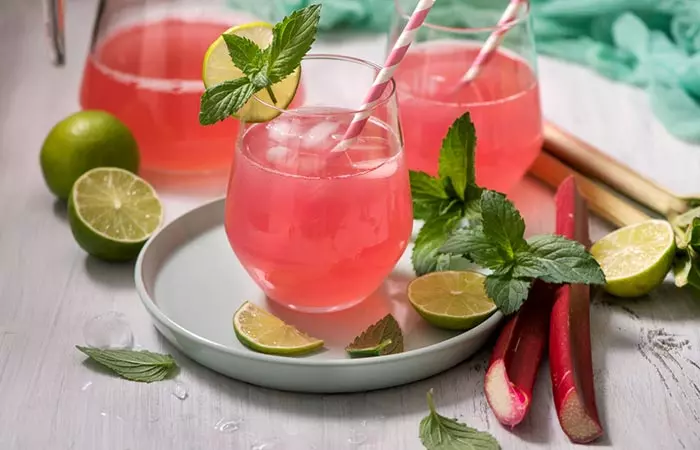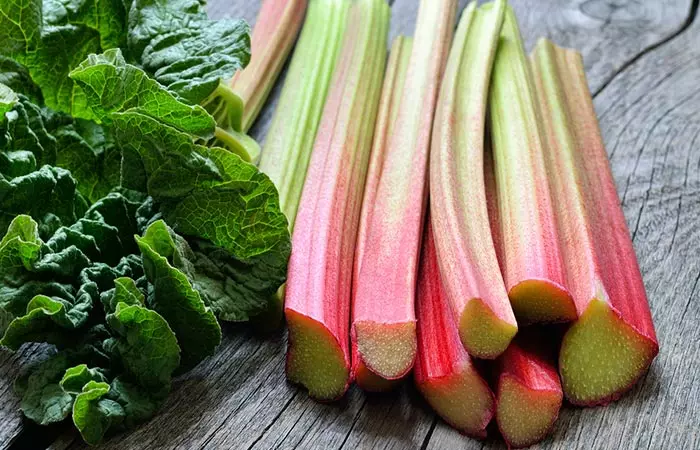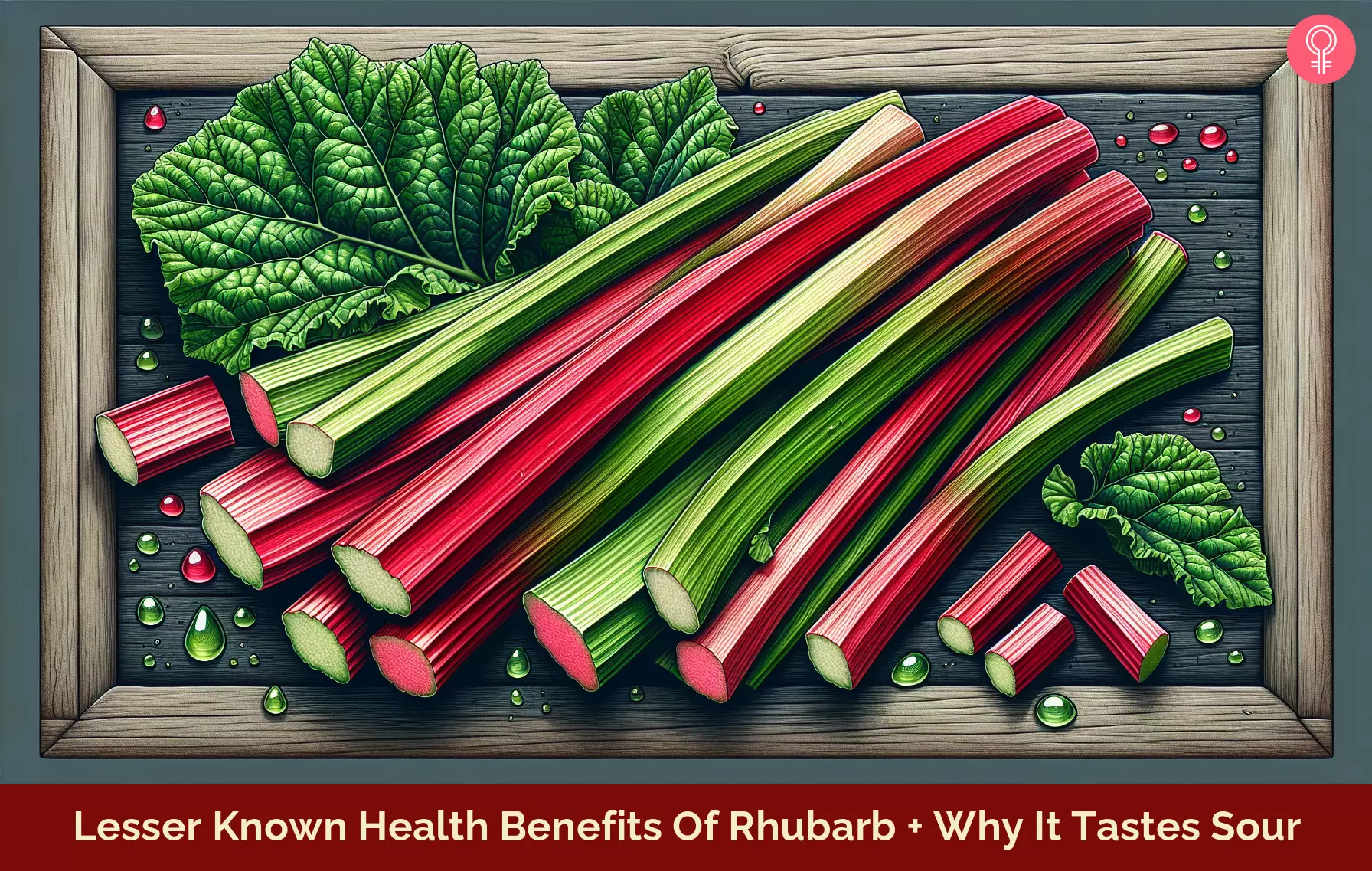What Is Rhubarb? How Is It Good For You?
Rhubarb looks like red celery (kind of), but has large leaves and is often considered a fruit (there’s some confusion here, but we will get to it later). The stem of the plant is usually cooked, which can be eaten raw as well. You can also make a yummy juice out of rhubarb and add other healthy ingredients like aloe vera, ginger, turmeric, cinnamon, honey or lemon to it. Who Can Consume It? Anyone can consume it except people with kidney stones, liver problems, and children. How Often? You can consume 20 to 50 milligrams of rhubarb per 1 kg of body weight daily. Caution Avoid if you are pregnant or breastfeeding. Excess consumption may lead to diarrhea or constipation, or stomach ache.
One serving of rhubarb meets 45% of your daily vitamin K needs – the nutrient supports bone health. The vitamin C in rhubarb wards off infections, and the vitamin A and lutein in the fruit (or veggie, whatever) boost vision health. There are other ways it can be quite good for you and your family. We will get there now.
What Are The Health Benefits Of Rhubarb?
1. Rhubarb Relieves Constipation
Being a natural laxative, rhubarb can be used to treat constipation. Studies show that rhubarb possesses antidiarrheal effects, thanks to its tannin content (1). It also contains sennosides, compounds that act as stimulative laxatives (2). Rhubarb also contains high amounts of dietary fiber that can boost digestion.
2. Strengthens The Bones
We already saw that rhubarb packs a good dose of vitamin K, which plays a role in bone metabolism and helps prevent osteoporosisi A systematic skeletal disorder that renders bones weak and brittle, making them susceptible to fractures from minor forces like coughing or bending over. . Vitamin K is also important for bone formation. One study talks about how vitamin K can reduce fracture risk (3). Rhubarb is also a decent source of calcium (one cup meets 10% of the daily requirement), another mineral crucial for bone health.
3. Boosts Brain Health
The vitamin K in rhubarb limits neuronal damage to the brain – and this can happen to the point of preventing Alzheimer’s. As per a study, rhubarb can help in the treatment of inflammation in the brain (4). This makes it a preventative measure against Alzheimer’s, stroke, and ALS (amyotrophic lateral sclerosis)i A progressive degenerative neurological condition that affects the nerve cells in the brain and spinal cord and results in loss of muscle control. .
4. Rhubarb Aids Weight Loss
Rhubarb was found to reduce bad cholesterol, and since it is a low-calorie food choice, it sure can be a great addition to a weight loss diet. It also contains catechins, the same compounds in green tea that give it its beneficial properties. Catechins are known to boost metabolism, and this also helps burn body fat and aid weight loss. Rhubarb is also a good source of fiber, another nutrient important for weight loss. Because of its laxative properties, rhubarb is a prominent ingredient in certain weight loss formations (5).
5. Helps Combat Cancer
Animal studies have shown that physcion, a concentrated chemical in rhubarb that gives its stems their color, can kill 50% of cancer cells in a matter of 48 hours (6). We need more research on this before we come to a conclusion, though. The cancer-fighting properties of rhubarb are particularly enhanced when it is baked – baking it for 20 minutes has shown to dramatically increase its anti-cancerous properties (7).
6. Might Aid Diabetes Treatment
Some research has shown that compounds found in the stems of rhubarb can help improve blood sugar levels and even lower cholesterol. The active compound, called rhaponticin, was found to be beneficial for diabetes.
7. Protects The Heart
Being a good source of fiber, rhubarb has shown to lower cholesterol levels. Consuming rhubarb stalk fiber was found to reduce bad cholesterol by 9% (8). Other studies talk about the active compounds in rhubarb that protect the arteries from damage, which might otherwise lead to heart disease. Some sources say that rhubarb can also lower blood pressure.
8. Rhubarb Can Improve Vision
There is less information on this. However, rhubarb contains lutein and vitamin C, both of which work well for vision.
9. Can Aid Kidney Health
One study shows how rhubarb supplementation can improve the therapeutic effects in the treatment of stage 3 and stage 4 chronic kidney disease (9). But since rhubarb contains some oxalic acid, it can cause or aggravate kidney stones. Hence, please consult your doctor before you consume it.
10. Relieves PMS Symptoms
Studies show that rhubarb can relieve hot flashes, and this is especially true in the cause of perimenopausei Also known as the menopausal transition, it marks the end of the reproductive years as the body naturally enters menopause. (10). Rhubarb also contains phytoestrogensi Naturally occurring plant compounds that upon consumption, have effects similar to when estrogen is produced by the body. , and some research says such foods can help relieve symptoms of menopause.
11. Delays Skin Aging
Rhubarb is a storehouse of vitamin A. Natural antioxidants in rhubarb helps in neutralizing free radicals and delays the symptoms of aging (like wrinkles and fine lines). Thus, rhubarb keeps your skin youthful and glowing by preventing the cell damage by free radicals. Rhubarb is a natural antibacterial and antifungal agent and helps protect your skin from various infections. Raw rhubarb, in the form of a paste, had been advocated by alternative medicine practitioners as a topical application for various skin infections. You can make a paste of rhubarb stems and apply to your face. Leave it on for 15 minutes and wash off with cold water. Repeat every morning.
12. Rhubarb Works As A Natural Hair Coloring Agent
Rhubarb root contains a good dose of oxalic acid that is known to render a light brown or blonde hue to the hair. The presence of oxalic acid makes the hair color last longer and does not harm the scalp. Add about three tablespoons of powdered rhubarb roots to two cups of water and simmer it for 15 minutes. Allow it to rest overnight. Strain the liquid in the morning and rinse your hair with this mixture for an awesome hair color. Michelle Lee-Ann, an author, shared her experience of using rhubarb to help manage her migraines. She said, “ I fell back in love with rhubarb. I made simple syrups, juice, crisps and pies, and bread galore. It helped me stave off migraine attacks, and tasted delicious (i).” These are the benefits. Adding rhubarb to your diet can be a good idea after all. Discover a delicious rhubarb recipe below.
Rhubarb Recipe
Maple Syrup-Cinnamon Roasted RhubarbIngredients
4 cups of fresh rhubarb 1/2 cup of maple syrup 1 teaspoon of vanilla extract 1/2 teaspoon of ground cinnamon A pinch of salt 1 tablespoon of lemon juice
How To Prepare Rhubarb adds a unique twist to your usual fruit-based desserts. But we have one important question to be answered.
Why Does Rhubarb Taste So Sour?
Not just sour – but excruciatingly sour. In fact, it is the most sour-tasting vegetable out there. And this is because of the high amounts of malic acid and oxalic acid in it. Malic acid is commonly found in most fruits and vegetables, and it imparts the sour taste to most of these foods. Quite interestingly, growing rhubarb in darkness was found to make it less sour. Well, okay. But did you hear anyone say that rhubarb could be poisonous? They are not completely wrong.
Is Rhubarb Poisonous?
The leaves are. Not the stalks that we recommend you to eat. The leaves are very rich in oxalic acid (more than the stems), and this makes them toxic. Other compounds in rhubarb leaves, called anthraquinone glycosides, can also make the leaves toxic. Symptoms of toxicity include a burning sensation in the mouth and throat, eye pain, difficulty in breathing, diarrhea, weakness, and even vomiting. Death can occur, although it is quite rare as one needs to consume too many rhubarb leaves for that. Simple. Just focus on the stalks. You can eat the stalks raw. Just dip them in some sugar or honey. You can also juice it. Or even make rhubarb tea – by steeping the stalks in hot water for 20 minutes and then draining the liquid. Talking about dosage, 20 to 50 milligrams of rhubarb per 1 kg of body weight is considered safe for enhanced nutrition. All good. But like everything else, rhubarb has its share of side effects that you must know.
What Are The Side Effects Of Rhubarb?
Can Be Harmful For Children
Even though rhubarb stalks contain very less oxalic acid, they still can be harmful for children under 4 years of age.
Issues With Pregnancy And Breastfeeding
Rhubarb can be unsafe if used in quantities more than those found in foods.
Might Aggravate Diarrhea Or Constipation
Excess of rhubarb can aggravate these conditions.
Kidney Stones
Due to the presence of oxalic acid, rhubarb might aggravate kidney stones.
Liver Problems
Rhubarb can make the problem worse in people who have liver issues. Can rhubarb cause any allergies or sensitivities? The following infographic provides information about the health benefits of rhubarb. Check it out.Illustration: StyleCraze Design Team Yes, you may experience allergic reactions such as hives, redness, itching, and difficulty in breathing after coming into contact with rhubarb. Consult your physician in case your symptoms worsen. Are there any potential interactions between rhubarb and certain medications? Yes, studies have shown that the anthraquinones present in rhubarb may interfere with the working of some drugs like saxagliptin (10), (15). Are there any nutritional differences between cooked and raw rhubarb? Yes, cooked rhubarb shows significantly fewer nutrients than raw one (16), (17).
Illustration: Lesser Known Health Benefits Of Rhubarb + Why It Tastes Sour
Discover the amazing health benefits of rhubarb with this insightful video! From aiding digestion to reducing inflammation, click on this video to know more about this powerful vegetable.












